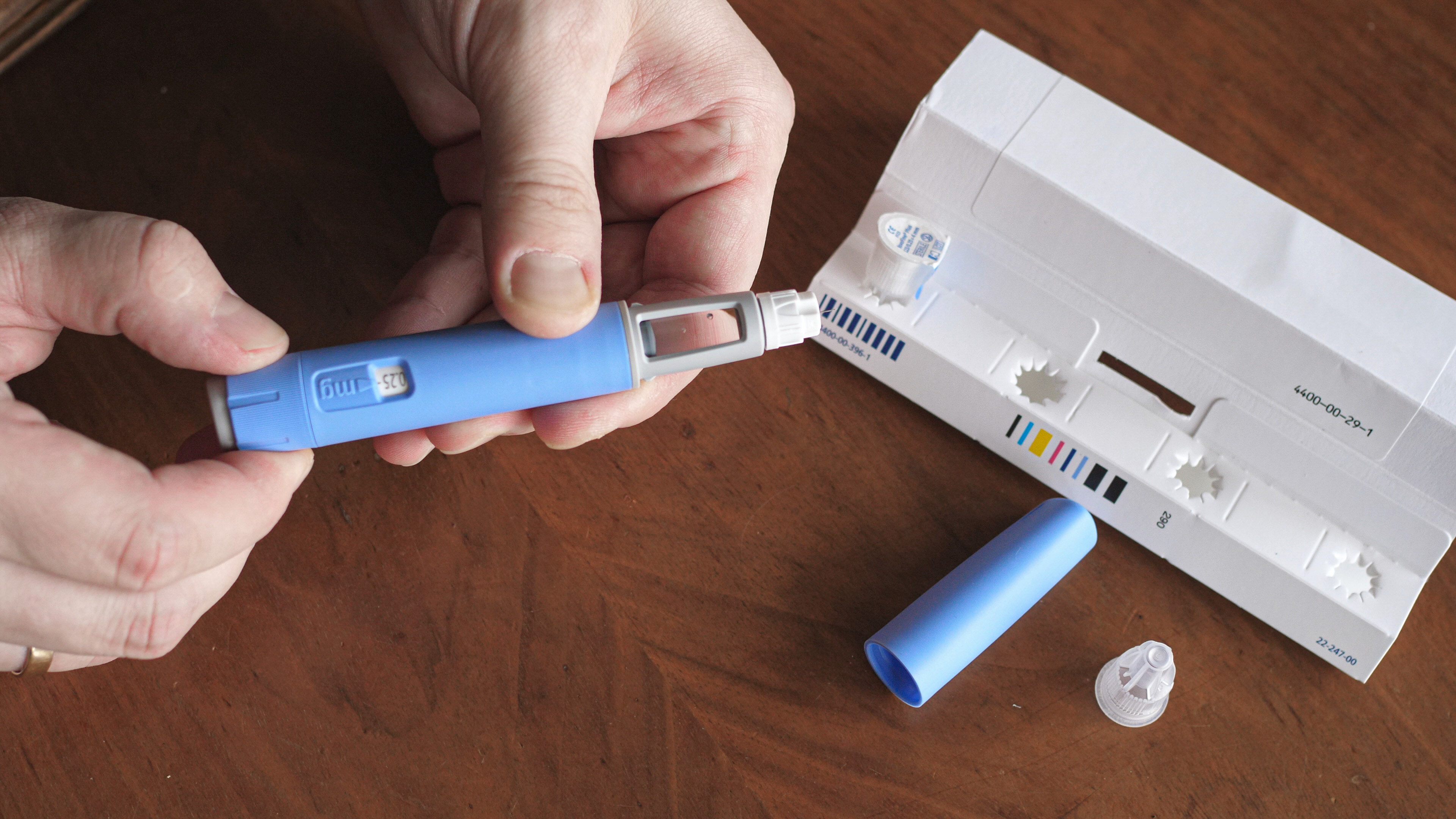Mounjaro for Weight Loss: Does it Work?
A comprehensive guide to using Mounjaro for weight loss
New weight loss medications make headlines every few months. Mounjaro, manufactured by Eli Lilly, is gaining steam based on its remarkable efficacy in helping patients lose weight. Although the drug is not FDA-approved for weight loss, healthcare providers are increasingly prescribing Mounjaro and drugs like it to help patients achieve and maintain a healthy weight. This article will examine how effective Mounjaro is as a weight loss drug, how it works, and what to consider before taking it.
What is Mounjaro?
Mounjaro is a prescription medication manufactured by drugmaker Eli Lilly. The U.S. Food and Drug Administration (FDA) has approved Mounjaro for use in American markets as a treatment for type 2 diabetes. It is supplied as an injectable pen that should be used once a week. Mounjaro is only available under its brand name (Mounjaro). It does not come in a generic version.
Mounjaro contains the active ingredient tirzepatide, which belongs to a novel class of drugs called dual glucose-dependent insulinotropic polypeptide (GIP) and glucagon-like peptide-1 (GLP-1) receptor agonists.
When blood sugar levels rise rapidly after consuming sugary or high-carbohydrate foods, it can lead to a surge in insulin production. This release can quickly drop blood sugar levels, triggering feelings of hunger and increased appetite shortly after eating. Blood sugar spikes can lead to overeating as the body tries to regulate blood sugar levels. You may feel the need to eat more to maintain stable blood sugar, which can contribute to consuming excess calories and weight gain over time. Frequent blood sugar spikes can also lead to cravings for more sugary or carbohydrate-rich foods, creating a cycle of unhealthy eating habits.
The dual action of Mounjaro targets blood sugar levels in multiple ways.
Mounjaro's mechanisms of action include:
- Prompting the pancreas to release insulin when blood sugar levels are high (known as the glucose-dependent insulin response)
- Decreasing the release of glucagon, which aids in lowering blood sugar levels
- Slowing the process of stomach emptying, aiding in appetite control, and reducing food consumption
- Encouraging a feeling of fullness following meals
In sum, Mounjaro helps patients managing type 2 diabetes regulate their blood sugar levels (especially after meals) while also preventing an increased appetite and craving for sugary or high-carbohydrate food after eating.
How does Mounjaro work for weight loss?
The diabetes drug Mounjaro differentiates itself from other treatment options (like Novo Nordisk’s Ozempic or Wegovy) through its dual action. Whereas semaglutide—the active ingredient in Ozempic—only replicates the action of GLP-1 in the body, Moujaro replicates GLP-1 and GIP, which yields a more potent effect on blood sugar levels and weight management.
GLP-1
GLP-1 drugs are medications prescribed by doctors to help people with type 2 diabetes control their blood sugar levels. They mimic the actions of a natural hormone called GLP-1, which your body releases when you eat. When you have a meal, your body releases GLP-1, which tells your pancreas to make more insulin. Insulin is a hormone that helps lower the amount of sugar in your blood. It allows the sugar in your blood to enter your cells, which can be used for energy or stored for later. GLP-1 helps ensure that insulin is released at the correct times, like after a meal when your blood sugar goes up.
GLP-1 also does a few other helpful things. It reduces the release of another hormone called glucagon, which comes from the pancreas, too. Glucagon does the opposite of insulin; it raises blood sugar levels by telling your liver to release stored sugar into your blood. By blocking glucagon's action, GLP-1 helps prevent too much sugar from being released by the liver, which can lead to high blood sugar levels.
Furthermore, GLP-1 slows down your stomach emptying, making you feel full for longer after eating. It does this by directly affecting your stomach, causing it to take more time to pass food into the small intestine. This slower digestion means that the nutrients from your meal are released into your body more gradually.
GLP-1 also affects your brain, making you feel more satisfied and less hungry. When GLP-1 is released after you eat, it signals to your brain that your stomach is full, so you don't feel the need to eat more. This helps reduce your appetite.
Stabilized blood sugar levels and a reduced appetite have been shown to help patients managing type 2 diabetes also lose weight—when coupled with a reduced-calorie diet and increased physical activity.
GIP
The glucose-dependent insulinotropic polypeptide (GIP) is a hormone your gut releases when you eat. Its primary role is to help control your blood sugar levels in response to the food you consume after a meal, especially one containing carbohydrates and fats.
This hormone then signals your pancreas to release insulin, which helps your cells absorb and utilize the sugar from the food you've eaten, and it also prevents your liver from producing too much sugar.
While GIP’s role in weight loss is still being studied, its role in promoting insulin release and improving glucose uptake may indirectly support weight loss by helping to regulate blood sugar levels. Stable blood sugar levels can reduce cravings for sugary and high-calorie foods.
Is Mounjaro safe?
Mounjaro has been approved by the FDA as a supplement to diet and exercise to improve blood sugar regulation in patients with type 2 diabetes. This approval was based on the results of various clinical trials comparing Mounjaro to other diabetes treatments. Participants in these trials experienced significant reductions in their A1C levels, ranging from 1.7% to 2.4% for different dosages of Mounjaro, and also achieved weight loss between 12 lbs. to 25 lbs. on average.
While Mounjaro is safe and effective for most adults managing type 2 diabetes, it has been shown to cause side effects in some patients.
The most common side effects of Mounjaro include gastrointestinal issues like constipation, diarrhea, stomach discomfort, and gas.
Less common but more severe side effects may include allergic reactions, low blood sugar (hypoglycemia), as well as an increased risk of thyroid cancer, gallbladder disease, and acute pancreatitis.
In addition, Mounjaro may not be safe for certain individuals with previously diagnosed medical conditions.
Your healthcare provider may not prescribe Mounjaro if you meet one of the following criteria:
- You have a history of thyroid, pancreatic, gallbladder, or kidney issues
- You are under 18 years of age
- You have type 1 diabetes
- You have diabetic retinopathy
- You have a history of stomach or digestive problems
Mounjaro may not be prescribed to pregnant women, women who are trying to conceive, or women who are breastfeeding.
Before starting treatment with any prescription medication, you should tell your doctor about any medical conditions you have, any medications or supplements you are taking, and any allergies you may have. This information will help reduce the risk of any possible interactions or adverse reactions to Mounjaro.
Who should take Mounjaro for weight loss?
Moujaro is FDA-approved to regulate blood sugar levels in patients managing type 2 diabetes. Its use as a weight loss aid is off-label, meaning that weight loss is not the primary use of this drug. However, because 90% of adults with type 2 diabetes also have obesity or are overweight, the several benefits of Mounjaro affect both comorbidities.
Mounjaro may be prescribed to individuals with or without type 2 diabetes. When prescribed as a weight loss aid, it is specifically indicated for use in adults with obesity (with a body mass index— BMI—of 30 kg/m2 or greater) or overweight adults (a BMI of 27 kg/m2 or greater) who also have weight-related medical problems such as high blood pressure, heart disease, or obstructive sleep apnea.
In general, higher doses of tirzepatide—the active ingredient in Mounjaro—are shown to produce more significant effects on body weight. Mounjaro is usually supplied as a 2.5 mg dose for the first four weeks. After these four weeks, the dosage may increase to 5 mg per week, depending on the patient’s tolerance for the medication and the efficacy of treatment.
Talk to your healthcare provider about whether or not Mounjaro is right for you and your condition.
Is there an alternative to Mounjaro?
There are several drugs used for the treatment of obesity on the market. As of November 12th, the FDA has approved Eli Lilly and Company’s Zepbound (tirzepatide) injection specifically for this use (as opposed to the off-label use of Mounjaro).
Zepbound’s approval was based on clinical trials in which adults with obesity experienced significant weight loss when taking weekly injections of Zepbound in combination with diet and exercise. The highest dose of Zepbound resulted in an average weight loss of 48 pounds over 72 weeks, while the lowest dose led to an average loss of 34 pounds, compared to only 7 pounds in the placebo group. Moreover, 1 in 3 patients on the highest dose lost over 58 pounds.
The weight loss effected by Zepbound and adjunct lifestyle changes coincided with reduced cholesterol levels, blood pressure, and waist size.
Zepbound is not currently available, but will be soon. Talk to your healthcare provider about Zepbound and when it might become available for prescription.
How do I get a prescription for Mounjaro?
Mounjaro is a prescription drug, meaning that you must have a written order from a licensed healthcare provider to get it. There is no generic version of this drug, nor can you buy Mounjaro over the counter.
Weight loss drugs are prescribed to individuals with obesity or individuals who are overweight and managing a weight-related health condition. If you are curious about Mounjaro or any other weight loss drug, talk to your healthcare provider about whether or not these treatment options are right for you. You should also discuss the cost, potential side effects, and any concerns you may have.
How Sesame can help
Sesame offers an affordable and comprehensive online weight loss program to help you get started on your weight loss journey. Success by Sesame is a month-to-month subscription that includes a video consultation with a weight loss doctor or specialist of your choice, access to prescriptions for weight loss medication if appropriate, unlimited messaging with your provider, ongoing support, and more.
Maintaining a healthy weight can lead to significant health benefits, including a lower risk of heart disease, improved mobility, better sleep, and enhanced overall well-being. Get started on your weight loss journey today. Note that all prescriptions are at the discretion of your healthcare provider.








